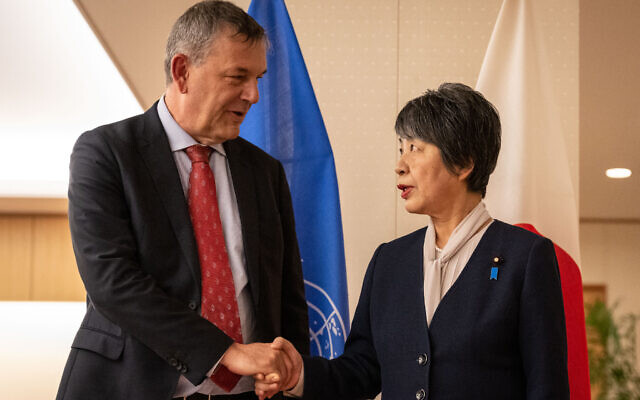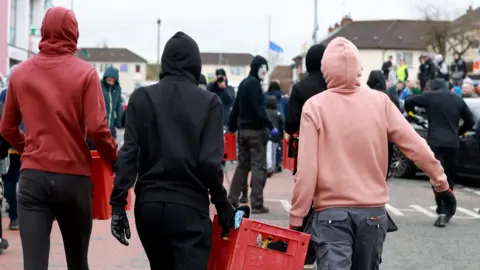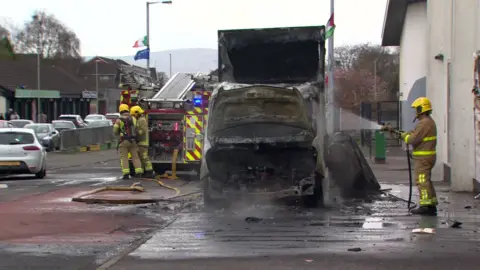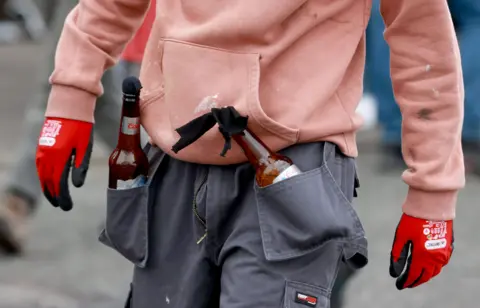Seven workers of the World Central Kitchen were killed in an Israeli airstrike in central Gaza. The victims included citizens from Australia, Britain, Poland, Palestine, and a dual citizen of the United States and Canada.

Seven workers of chef Jose Andres' World Central Kitchen, including citizens of Poland, Britain, and Australia, were killed in Gaza. (Photo: Reuters)
Reuters
UPDATED: Apr 2, 2024
In ShortSeven workers of World Central Kitchen NGO killed in Israeli airstrike in Gaza
Attack aimed to terrorise workers of international humanitarian agencies, says Hamas.
Israeli military reviewing the incident, calls it a 'tragic incident'
Citizens from Australia, Britain and Poland were among seven people working for celebrity chef Jose Andres' World Central Kitchen who were killed in an Israeli airstrike in central Gaza on Monday, the NGO said.
The workers, included Palestinians and a dual citizen of the United States and Canada, were travelling in two armoured cars emblazoned with the WCK logo and another vehicle, WCK said in a statement.
Despite co-ordinating movements with the Israeli Defence Force, the convoy was hit as it was leaving its Deir al-Balah warehouse, after unloading more than 100 tons of humanitarian food aid brought to Gaza by sea, WCK said.
This is not only an attack against WCK, this is an attack on humanitarian organizations showing up in the most dire of situations where food is being used as a weapon of war," said Erin Gore, chief executive of World Central Kitchen.
"This is unforgivable."
The Israeli military said it was doing a thorough review at the highest levels to understand the circumstances of what it called a tragic incident.
"The IDF makes extensive efforts to enable the safe delivery of humanitarian aid, and has been working closely with WCK in their vital efforts to provide food and humanitarian aid to the people of Gaza," the military said.
Andres, who started WCK in 2010 by sending cooks and food to Haiti after an earthquake, earlier said he was heartbroken and grieving for the families and friends of those who died.
"The Israeli government needs to stop this indiscriminate killing," he said on social media.
"It needs to stop restricting humanitarian aid, stop killing civilians and aid workers, and stop using food as a weapon. No more innocent lives lost. Peace starts with our shared humanity. It needs to start now."
In a statement, the Islamist group Hamas said the attack aimed to terrorise workers of international humanitarian agencies, deterring them from their missions.
AUSTRALIA CONFIRMS DEATH
Australian Prime Minister Anthony Albanese confirmed the death of 44-year-old aid worker Lalzawmi "Zomi" Frankcom and said his government had contacted Israel to demand those responsible be held accountable.
"This is a human tragedy that should never have occurred, that is completely unacceptable and Australia will seek full and proper accountability," he told a press conference on Tuesday.
Albanese said innocent civilians and humanitarian workers needed to be protected and reiterated his call for a sustainable ceasefire in Gaza along with more aid to help those suffering from "tremendous deprivation".
Video obtained by Reuters showed paramedics moving bodies into a hospital and displaying the passports of three of those killed.
"We are heartbroken and deeply troubled by the strike that killed @WCKitchen aid workers in Gaza," U.S. National Security Council spokesperson Adrienne Watson said on social media.
"Humanitarian aid workers must be protected as they deliver aid that is desperately needed, and we urge Israel to swiftly investigate what happened."
WCK said it was pausing its operations in the region immediately and would make decisions soon about the future of its work.
WCK delivers food relief and prepares meals for people in need. It said last month it had served more than 42 million meals in Gaza over 175 days.
WCK was involved in the first shipment of aid to Gaza via a sea corridor from Cyprus in March. A second WCK maritime aid shipment of 332 tons arrived in Gaza early this week.
Since starting operations in 2010, the organisation has delivered food for communities hit by natural disasters, refugees at the U.S. border, healthcare workers during the COVID-19 pandemic and people in conflicts in Ukraine and Gaza.
Wafaa Shurafa And Samy Magdy, The Associated Pressabout 6 hours ago
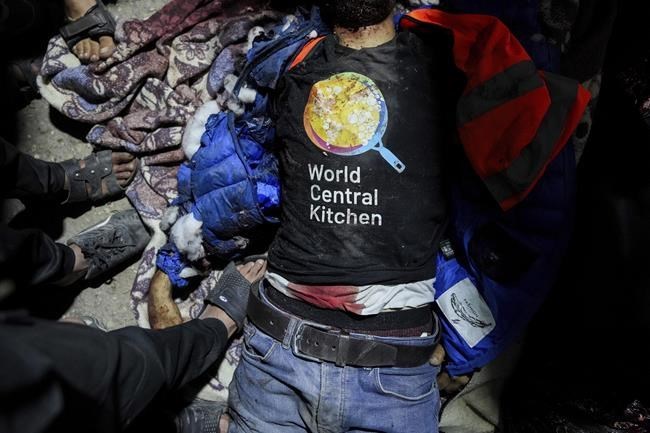 The body of a person wearing a World Central Kitchen t-shirt lies on the ground at the Al Aqsa hospital in Deir al-Balah, Gaza Strip, Monday, April 1, 2024. World Central Kitchen, an aid group, says an Israeli strike that hit its workers in Gaza killed at least seven people, including several foreigners. (AP Photo/Abdel Kareem Hana)
The body of a person wearing a World Central Kitchen t-shirt lies on the ground at the Al Aqsa hospital in Deir al-Balah, Gaza Strip, Monday, April 1, 2024. World Central Kitchen, an aid group, says an Israeli strike that hit its workers in Gaza killed at least seven people, including several foreigners. (AP Photo/Abdel Kareem Hana)DEIR AL-BALAH, Gaza Strip (AP) — An apparent Israeli airstrike killed six international aid workers with the World Central Kitchen and their Palestinian driver, the charity said Tuesday, in a potentially major setback to efforts to deliver aid by sea to Gaza, where Israel’s offensive against Hamas has pushed hundreds of thousands of Palestinians to the brink of starvation.
The food charity, founded by celebrity chef José Andrés, said it was immediately suspending operations in the region.
Footage showed the bodies, several wearing protective gear with the charity’s logo, at a hospital in the central Gaza town of Deir al-Balah. Those killed include three British nationals, an Australian, a Polish national and an American-Canadian dual citizen, according to hospital records.
The source of fire late Monday could not be independently confirmed. The Israeli military said it was conducting a review “to understand the circumstances of this tragic incident.”
The charity said the team was traveling in a three-car convoy that included two armored vehicles.
“Despite coordinating movements with the (Israeli army), the convoy was hit as it was leaving the Deir al-Balah warehouse, where the team had unloaded more than 100 tons of humanitarian food aid brought to Gaza on the maritime route.”
Erin Gore, the CEO of the charity, said "this is not only an attack against WCK, this is an attack on humanitarian organizations showing up in the most dire of situations where food is being used as a weapon of war. This is unforgivable.”
Three aid ships from the Mediterranean island nation of Cyprus arrived earlier Monday carrying some 400 tons of food and supplies organized by the charity and the United Arab Emirates, the group’s second shipment after a pilot run last month. The Israeli military was involved in coordinating both deliveries.
The U.S., which has provided key military and diplomatic support for Israel's offensive, has touted the sea route as a new way to deliver desperately needed aid to northern Gaza and plans to build its own floating dock, with construction expected to take several weeks.
The U.N. has said much of the population is on the brink of starvation, largely cut off from the rest of the territory by Israeli forces. Israel has barred UNRWA, the main U.N. agency in Gaza, from making deliveries to the north, and other aid groups say sending truck convoys north has been too dangerous because of the military’s failure to ensure safe passage.
The UNRWA said in its latest report that 173 of its workers have been killed in Gaza. The figure does not include workers for other aid organizations.
The bodies of the aid workers have been taken to a hospital in the southern city of Rafah on the Egyptian border, according to an Associated Press reporter at the hospital. The foreigners’ bodies will be evacuated out of Gaza and the Palestinian driver’s body will be handed to his family in Rafah for burial.
Australian Prime Minister Anthony Albanese confirmed that Zomi Frankcom, 44, of Melbourne, was among those killed and said his government has requested an explanation from Israel.
“This is someone who was volunteering overseas to provide aid through this charity for people who are suffering tremendous deprivation in Gaza. And this is just completely unacceptable,” Albanese told reporters.
“We want full accountability for this because this is a tragedy that should never have occurred."
Poland’s Foreign Ministry posted “sincerest words of sympathy” to the family of a volunteer who had offered assistance to Palestinians in the Gaza Strip, without saying how he was killed. The Foreign Ministry said it is requesting an explanation from Israel.
Britain’s Foreign Office said it was aware of reports of the death of a British national in Gaza and was "urgently seeking further information.”
The war began when Hamas-led militants stormed into southern Israel on Oct. 7, killing some 1,200 people and abducting around 250 hostages. Israel responded with one of the deadliest and most destructive offensives in recent history.
At least 32,845 Palestinians have been killed, around two-thirds of them women and children, according to Gaza’s Health Ministry, which does not distinguish between civilians and combatants in its count. Israel blames the civilian toll on Palestinian militants because they fight in dense residential areas.
Aid groups have repeatedly called for a humanitarian cease-fire, saying it's the only way to reach people in need. The United States, Qatar and Egypt have spent months trying to broker another cease-fire and hostage release but the indirect talks between Israel and Hamas remain bogged down.
Hamas is believed to be holding some 100 hostages and the remains of 30 others after freeing most of the rest during a cease-fire in November in exchange for the release of Palestinians imprisoned by Israel.
___
Magdy reported from Cairo. Associated Press writer Monika Scislowska in Warsaw, Poland contributed.
___
Find more of AP’s coverage at https://apnews.com/hub/israel-hamas-war
Wafaa Shurafa And Samy Magdy, The Associated Press
April 2, 2024

Seven aid people working with World Food Kitchen, the charity spearheading efforts to alleviate looming famine in Gaza, were fatally killed early Tuesday in an Israeli airstrike on their vehicle in Deir Al-Balah City, in the Middle of the Gaza enclave.
The aid workers, from the UK, Australia, Poland, and Palestine, as well as a US-Canada dual citizen, were in two armoured vehicles branded with the charity’s logo when Israeli air forces hit them with the violent attack, according to a statement by World Central Kitchen.
The charity said it had already coordinated with the Israeli army before started working in the enclave. Despite that, the convoy was hit as it was leaving the Deir al-Balah warehouse, where the team had unloaded more than 100 tons of humanitarian food aid brought to Gaza on the maritime route, the charity added.
Erin Gore, the CEO of WCK, said: “This is not only an attack against WCK, this is an attack on humanitarian organizations showing up in the direst of situations where food is being used as a weapon of war. This is unforgivable.”
Following the horrific incident, the charity announced it would pause its operations in the region and reconsider its future work, raising fears that a nascent aid maritime corridor from Cyprus to Gaza is in the face of repeated Israeli obstructions and may collapse.
Last month, more than 100 people were killed when Israeli forces opened fire at an aid distribution point in Gaza City.
Human Rights Watch condemned the attack on humanitarian work in Gaza, saying more than 170 relief workers were murdered by ‘Israel’ while in duty in Gaza.
The UN has warned that at least 576,000 Gazans are on the brink of famine amid growing global pressure on ‘Israel’ to increase the flow of aid.
The number of aid trucks entering the Gaza enclave by land over the past five months has been far below the 500 a day that entered before the war.
Current flow of truckloads of aid 'remains well below operational target,' says UN spokesman Dujarric
2/04/2024 Tuesday
AA
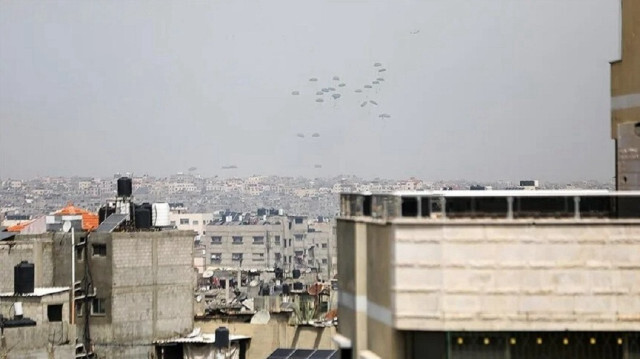
File photo
The UN on Monday warned of the insufficient flow of humanitarian aid trucks into Gaza, saying that there is no significant change in the number of trucks going in.
"For its part our colleagues in UNRWA said there has been no significant change in the volume of humanitarian supplies entering Gaza or improved access to the north," UN spokesperson Stephane Dujarric said during a press briefing.
Noting that more than 150 trucks have crossed into Gaza per day in the month of March, Dujarric said: "This remains well below the operational target of 500 trucks per day."
Israel has waged a deadly military offensive on the Gaza Strip since an Oct. 7 cross-border attack by Hamas which killed some 1,200 people.
Nearly 32,800 Palestinians have since been killed and 75,300 others injured amid mass destruction and shortages of necessities. Israel has imposed a crippling blockade on the Gaza Strip, leaving its population, particularly residents of northern Gaza, on the verge of starvation.
The Israeli war has pushed 85% of Gaza's population into internal displacement amid acute shortages of food, clean water, and medicine, while 60% of the enclave's infrastructure has been damaged or destroyed, according to the UN.
Israel stands accused of genocide at the International Court of Justice (ICJ), which on Thursday asked Israel to do more to prevent famine in Gaza.
- UN concerned over Israeli airstrikes on Syria
Dujarric further expressed the UN's concerns over Israel's airstrikes on positions near the Syrian capital Damascus, injuring two civilians.
"We condemn all these attacks, but we're waiting to get facts on what happened today," he added.
Asked about reports of Israel submitting a proposal to the UN calling for the dismantling of the UN Relief and Works Agency (UNRWA), Dujarric said he has not seen any document regarding the mentioned reports.
"No such document was received by the Secretary General's office as of this morning," he said, adding that the UN's position on UNRWA "remains unchanged."
"UNRWA is the lifeline of hope, of services, for millions of Palestinians in the region, including in Gaza. It's currently the backbone, the spine, the arms and the legs for our humanitarian operation there," he said.
Following the unproven Israeli accusation that some UNRWA staffers were involved in the Oct. 7 attacks, many countries suspended payments to the aid agency in late January, pending an investigation.
Several countries, including Canada, Sweden, Finland, and France as well as the European Commission, however, as of the beginning of March, announced resuming funding to UNRWA.
UNRWA was established by the UN General Assembly more than 70 years ago to assist Palestinians who were forcibly displaced from their land.
Asked about the Israeli Knesset's approval of legislation allowing the closure of Al Jazeera television, Dujarric said: "Any limitation on the right of journalists to operate anywhere in the world is of deep concern and we've seen from all over the world a negative trend in that in that regard."
Earlier, the Knesset passed second and third readings of a bill that would allow the closure of Al Jazeera.
The first reading of the bill was passed on Feb. 12.
Netanyahu met with coalition whip Ofir Katz and urged him to pass the bill on Monday, his Likud Party said in a statement.
Al Jazeera has an office in Israel and a team of correspondents working year-round, including covering Israel's ongoing war on the Gaza Strip, which has killed nearly 32,850 people since Oct. 7, 2023.
Is President Biden’s pier plan for Gaza aid theater?
"Today, we witness the total Israeli destruction of the most important, 700 beds specialty hospital in Gaza, Al Shifa Medical Complex," said Mads Gilbert, a Norwegian doctor, in his account on X.
Anadolu Agency
April 01,2024
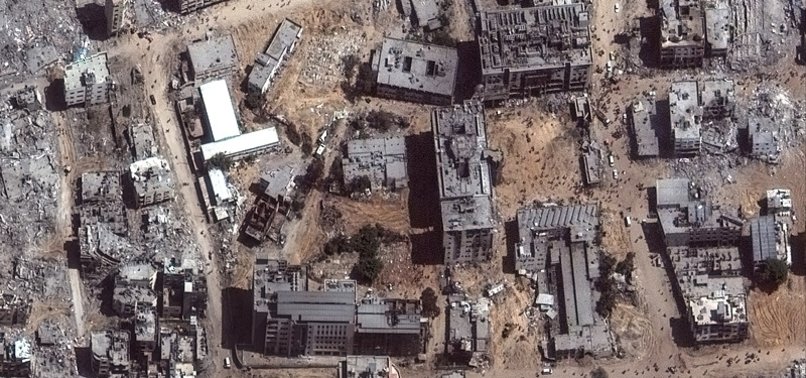
This satellite image provided by Maxar Technologies shows an overview of Al Shifa hospital and surroundings in Gaza City, on Monday, April 1, 2024. (AP Photo)
A Norwegian doctor, working at the Al-Shifa Hospital in Gaza for 16 years, said that the hospital has been into a "House of Death by Israel and the US."
"Today, we witness the total Israeli destruction of the most important, 700 beds specialty hospital in Gaza, Al Shifa Medical Complex," said Mads Gilbert in his account on X.
Emphasizing that the hospital was established during the British mandate, he added: "The name Shifa meaning 'The House of Healing'; now turned into a 'House of Death' by Israel and the US, burnt, totally destroyed to rubble and turned into a graveyard of patients, medical staff, relatives and refugees."
Gilbert emphasized that this marks a "symbol of heartless, cynical Israeli politics of colonial occupation with the goal of elimination of the Palestinian people, their social institutions and their lives."
"US, EU, UK governments stand shamed, complicit by their support for Israeli war crimes and atrocities against all humanity," he added.
Earlier in the day, Israel announced that it has withdrawn from Gaza Strip's largest health complex, Al-Shifa Hospital, and its surroundings after its two-week long raids there which had begun on March 18.
During the 14-day attacks, the Israeli army killed more than 200 Palestinians and detained over 900 Palestinians in and around the hospital.
The hospital was previously raided Nov. 16 after it was besieged for one week when its courtyards, parts of its buildings, medical equipment and the power generator were destroyed.
Israel has waged a deadly military offensive on the Gaza Strip since an Oct. 7 cross-border attack by Hamas which killed some 1,200 people.
Nearly 32,800 Palestinians have since been killed and 75,300 others injured amid mass destruction and shortages of necessities. Israel has imposed a crippling blockade on the Gaza Strip, leaving its population, particularly residents of northern Gaza, on the verge of starvation.
The Israeli war has pushed 85% of Gaza's population into internal displacement amid acute shortages of food, clean water, and medicine, while 60% of the enclave's infrastructure has been damaged or destroyed, according to the UN.
Israel stands accused of genocide at the International Court of Justice (ICJ), which on Thursday asked Israel to do more to prevent famine in Gaza.
After 14 days, Israel turned Al-Shifa Hospital into 'death complex,' say eyewitnesses
Medical staff, patients, displaced people trapped inside hospital during Israeli army's two-week raid
AA
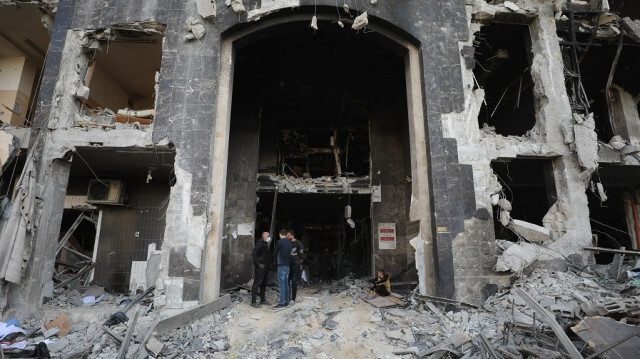
The Israeli army committed "horrific massacres" in the course of its devastating raid on Al-Shifa Hospital in western Gaza City, according to witnesses.
Three Palestinian witnesses who were inside the hospital during the two-week incursion on the hospital and its surrounding area spoke to Anadolu.
The Israeli army withdrew from the hospital early Monday after a 14-day raid, leaving behind dozens of people dead and a trail of massive destruction.
Nurse Loay Abu Asi was working inside Al-Shifa Hospital's surgery building when the Israeli army raided the hospital at dawn on March 18.
"Before storming the hospital, a room inside the surgery building was hit, leaving some displaced people killed, along with some medical staff injured. After that, the gate's hospital was stormed and all the hospital's buildings were under the Israeli forces' blockade," Loay recounted.
He said that Israeli forces then began warning people inside through loudspeakers not to move or stand in front of the windows.
"We stayed for 24 hours inside the building without moving, while the Israeli bullets were hitting the building, and communications and electricity were cut off and there was no water or food," Loay added.
The next day, Israeli forces ordered people inside the surgery building to leave, arrested dozens, and telling others to evacuate towards southern the Gaza Strip.
They then ordered medical staff to exit the building, he said, adding: "They arrested a number of doctors, forced them to take off their clothes and tortured them inside the hospital's yard."
"They were calling us by name one by one, interrogating us while being stripped of our clothes," Loay said.
Loay said he was also arrested for 12 hours, interrogated and beaten before being released. After that, he was locked along with other medical staff and patients inside another building of the hospital for five days with no food, water, or medicine.
The nurse said some of the patients' wounds had rotted as they could receive no medical care.
Also speaking on his experiences inside the hospital during the raid, Hasan Al-Mansi, an injured patient, said he was interrogated by Israeli forces and forced to move from one building to another under heavy fire.
"Every person must pass in front of a camera for the Israeli army, then taken into interrogation," Al-Mansi said, adding that a number of patients, medical staff and displaced people were arrested by the Israeli forces.
Meanwhile, Abdel-Fattah al-Zaharneh a local resident living near the hospital, told Anadolu that he saw people being killed by Israeli forces, with their corpses laid down on the surrounding streets while Israeli bulldozers were ran them over.
"There was no water, no food. Here there was death and destruction. We were forced to drink unusable water," al-Zaharneh said.
Israel has waged a deadly military offensive on the Gaza Strip since an Oct. 7 cross-border attack by Hamas which killed some 1,200 people.
At least 32,845 Palestinians have since been killed and nearly 75,400 others injured amid mass destruction and shortages of necessities. Israel has imposed a crippling blockade on the Gaza Strip, leaving its population, particularly residents of northern Gaza, on the verge of starvation.
The Israeli war has pushed 85% of Gaza's population into internal displacement amid acute shortages of food, clean water, and medicine, while 60% of the enclave's infrastructure has been damaged or destroyed, according to the UN.
Israel stands accused of genocide at the International Court of Justice (ICJ), which on Thursday asked Israel to do more to prevent famine in Gaza.
Al-Shifa Medical Complex, the largest hospital in the Gaza Strip, is now out of service after the Israeli army destroyed almost all its buildings and killed or arrested most of its medical personnel. Israeli forces withdrew after a two-week siege, leaving the hospital buildings burned and completely destroyed.
April 2, 2024

Tens of thousands of people on Sunday gathered outside the Israeli parliament building in Jerusalem in the largest anti government protest

Tue, 2 Apr 2024
Tens of thousands of people on Sunday gathered outside the Israeli parliament building in Jerusalem in the largest anti government protest since Israel launched its assault on Gaza.
Doha-based broadcaster – Al Jazeera reported that the protesters on Sunday demanded the government to secure a ceasefire deal that would also free Israeli captives held by Hamas in Gaza and called for early elections.
Demonstrators claimed the Jerusalem protest was the biggest since Israel launched its war on Gaza in October.
Prime Minister Benjamin Netanyahu’s government has faced widespread criticism over the security failure of the October 7 Hamas-led attack on southern Israel in which 1,139 people were killed and about 250 others taken to Gaza, according to Israeli authorities.
Netanyahu has vowed to destroy Hamas and bring all the hostages home, yet those goals have been elusive. While Hamas has suffered heavy losses, it remains intact.
Roughly, half the hostages in Gaza were released during a weeklong ceasefire in November. But attempts by international mediators to bring home the remaining hostages have failed.
Israel’s war on Gaza has killed at least 32,782 people, mostly women and children, according to Palestinian authorities.
A new round of talks on a ceasefire and captive-prisoner exchange was expected to start on Sunday in Egypt’s capital, Cairo, although Hamas said the group had not decided whether to send a delegation.
Mediators had hoped to secure a ceasefire before the start of Ramadan, but progress stalled and the Muslim holy month is more than half over.
The crowd stretched for blocks around the Knesset and organisers have decided to continue the demonstration for several days.
The demonstrators say they would sleep in tents in the city to stage their protest, said Al Jazeera’s Hamdah Salhut, reporting from the demonstrations in West Jerusalem.
“They say they want to oust Netanyahu; they say they’re fed up with his policies, ones that have not seen the return of the remaining Israeli captives who are held in Gaza.”
The demonstrators also demanded new elections nearly two years ahead of schedule.
Opposition leader Yair Lapid criticised Netanyahu at the demonstration, saying he was destroying Israel’s relations with the United States and leaving the captives to their fate.
The prime minister was doing “everything for politics, nothing for the country”, Lapid said.
Thousands of others demonstrated in Tel Aviv, Israel’s largest city.
Netanyahu, in a nationally televised speech before he was due to undergo hernia surgery, said he understood families’ pain.
He said calling new elections would paralyse Israel for six to eight months.
Japan resumes funding to UNRWA for its ‘indispensable’ aid work in Gaza
Sixth-biggest donor to UN agency for Palestinians lifts moratorium on payments, plans to release some $35 million of originally allocated funding
Japan on Tuesday said it will lift its suspension of funding to the UN Palestinian refugee agency UNRWA as the relief body works to regain trust after Israel surfaced intelligence that its staff were involved in Hamas’s brutal October 7 onslaught on Israel.
Japan, the sixth-biggest donor to the agency, and 15 other countries paused about $450 million in funding following the allegations in January, throwing the agency’s operations in the Gaza Strip into turmoil.
Countries including Australia and Canada have since restored funding to UNRWA, the largest relief body operating in Gaza, amid the ongoing war between Israel and the Hamas terror group, which rules the enclave.
Japan’s Foreign Minister Yoko Kamikawa, who met UNRWA head Philippe Lazzarini in Tokyo last week, said the agency’s role in Gaza was “indispensable” even as it works to improve governance and manage risks.
“Japan will lift the moratorium on its financial contributions to UNRWA and provide assistance while ensuring and confirming the appropriateness of Japan’s funds,” Kamikawa told reporters, adding that about $35 million of originally planned funding was ready to be released.
A senior foreign ministry official later told a press briefing that Japan could not comment on the veracity of Israel’s allegations against UNRWA due to an ongoing investigation by the UN Office of Internal Oversight Services.
 A Palestinian man transports sacks of humanitarian aid at the distribution center of the United Nations Relief and Works Agency for Palestine Refugees (UNRWA), in Rafah in the southern Gaza Strip on March 3, 2024. (AFP)
A Palestinian man transports sacks of humanitarian aid at the distribution center of the United Nations Relief and Works Agency for Palestine Refugees (UNRWA), in Rafah in the southern Gaza Strip on March 3, 2024. (AFP)In February, Israel revealed the identities of the 12 UNRWA staff members who it said “actively participated” in the October 7 massacre, which saw thousands of Hamas-led terrorists burst into Israel, killing some 1,200 people and seizing 253 hostages, mostly civilians, amid acts of brutality and sexual assault.
Among the staff who took part in the attack are teachers, counsellors and social workers who worked at UNRWA schools, Israel said.
Israel has also shared intelligence indicating that of the 13,000 UNRWA employees in Gaza, at least 12% are affiliated with the Hamas and Palestinian Islamic Jihad terror groups.
UNRWA fired some staff following the allegations. It later claimed some employees released into Gaza from Israeli detention said they were coerced by Israeli authorities into falsely stating that staff took part in the October 7 attack,
The assertions are contained in a report by the UN Relief and Works Agency for Palestine Refugees (UNRWA) reviewed by Reuters and dated February 2024, which detailed allegations of mistreatment in Israeli detention made by unidentified Palestinians, including several working for UNRWA.
Reuters could not independently confirm the accounts of coercion of UNRWA staff and mistreatment of detainees, although the allegations of ill-treatment accord with some descriptions by Palestinians freed from detention in December, February and March reported by Reuters and other news media.
A separate review of the UNRWA’s activities and neutrality led by former French foreign minister Catherine Colonna is expected to publish its final report later this month.
Israel has started working with other groups in Gaza, such as the UN World Food Programme, to deliver humanitarian aid to Palestinians instead of UNRWA, which it has said it is seeking to shut down following years of allegations.
Japan on Tuesday said it will lift its suspension of funding to the UN Palestinian refugee agency UNRWA as the relief body works to regain trust after Israel surfaced intelligence that its staff were involved in Hamas’s brutal October 7 onslaught on Israel.
Japan, the sixth-biggest donor to the agency, and 15 other countries paused about $450 million in funding following the allegations in January, throwing the agency’s operations in the Gaza Strip into turmoil.
Countries including Australia and Canada have since restored funding to UNRWA, the largest relief body operating in Gaza, amid the ongoing war between Israel and the Hamas terror group, which rules the enclave.
Japan’s Foreign Minister Yoko Kamikawa, who met UNRWA head Philippe Lazzarini in Tokyo last week, said the agency’s role in Gaza was “indispensable” even as it works to improve governance and manage risks.
“Japan will lift the moratorium on its financial contributions to UNRWA and provide assistance while ensuring and confirming the appropriateness of Japan’s funds,” Kamikawa told reporters, adding that about $35 million of originally planned funding was ready to be released.
A senior foreign ministry official later told a press briefing that Japan could not comment on the veracity of Israel’s allegations against UNRWA due to an ongoing investigation by the UN Office of Internal Oversight Services.

In February, Israel revealed the identities of the 12 UNRWA staff members who it said “actively participated” in the October 7 massacre, which saw thousands of Hamas-led terrorists burst into Israel, killing some 1,200 people and seizing 253 hostages, mostly civilians, amid acts of brutality and sexual assault.
Among the staff who took part in the attack are teachers, counsellors and social workers who worked at UNRWA schools, Israel said.
Israel has also shared intelligence indicating that of the 13,000 UNRWA employees in Gaza, at least 12% are affiliated with the Hamas and Palestinian Islamic Jihad terror groups.
UNRWA fired some staff following the allegations. It later claimed some employees released into Gaza from Israeli detention said they were coerced by Israeli authorities into falsely stating that staff took part in the October 7 attack,
The assertions are contained in a report by the UN Relief and Works Agency for Palestine Refugees (UNRWA) reviewed by Reuters and dated February 2024, which detailed allegations of mistreatment in Israeli detention made by unidentified Palestinians, including several working for UNRWA.
Reuters could not independently confirm the accounts of coercion of UNRWA staff and mistreatment of detainees, although the allegations of ill-treatment accord with some descriptions by Palestinians freed from detention in December, February and March reported by Reuters and other news media.
A separate review of the UNRWA’s activities and neutrality led by former French foreign minister Catherine Colonna is expected to publish its final report later this month.
Israel has started working with other groups in Gaza, such as the UN World Food Programme, to deliver humanitarian aid to Palestinians instead of UNRWA, which it has said it is seeking to shut down following years of allegations.

